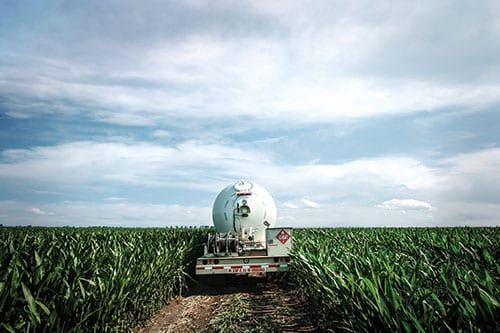Environmental Benefits of Propane

Propane is a clean, environmentally-friendly energy source.
Now, more than ever, people are paying more attention to their carbon footprint. As a hydrogen-rich fuel, propane is a naturally clean, low-emissions energy source. In fact, it is classified by the federal government as a clean fuel, emitting far less greenhouse gas than most other energy sources. Because it is also incredibly efficient, propane can effectively provide heat, hot water and other functions while reducing the homeowners’ environmental impact compared to electricity.
For the ultimate in efficiency and environmental friendliness, propane is also seen in Zero Net Energy (ZNE) homes, which produce as much energy as they use.
Meeting America’s Energy Needs
Our state, nation, and larger world depend on energy. Lots and lots of energy. Taking a minute to look at the numbers may help explain why finding clean energy is important. In the United States alone, over 284 million vehicles1 roam the roadways and over 142 million homes need heating and cooling.2 By any definition, that is a lot of energy.
Add in business, agriculture, air travel and all the rest and it becomes clear that no single source of energy can satisfy America’s needs. We are in an energy transformation that will last decades. For that reason, the goal should be to use as much renewable energy as possible while satisfying America’s appetite for energy with a source that is readily available and environmentally friendly - propane.
When evaluating green energy most people may only want to talk about the power source itself, ignoring what damage was done to the environment in creating or disposing of the item in question. But we must look upstream and downstream to fully check the environmental impact of energy. An upstream examination would include looking at how electricity is made and the environmental impact of batteries. Looking downstream would include examining what happens to renewable energy components when they need to be recycled.
Can Electricity, Solar and Wind Solve America’s Energy Needs?
Electrification
Choosing between today's and tomorrow's energy options is complex. Advocates for electrification argue it's key to environmental sustainability. Yet, this overlooks that electricity's environmental impact depends on its source. Furthermore, the U.S. infrastructure struggles to meet the growing electricity demand. For an in-depth analysis, refer to our propane vs. electricity comparison.
Solar
Propane stands out as an efficient and eco-friendly energy choice over solar, offering steady energy regardless of weather, lower costs, and less environmental waste. It bolsters local economies with domestic production and sidesteps the recycling issues of solar panels. For a comprehensive evaluation, delve into our discussion comparing propane and solar energy.
Wind
Wind power presents an alternative for generating energy through turbines, although it faces challenges in energy storage and transportation. Regulatory hurdles and public resistance to turbine locations underscore the imperfections of this solution.
Moreover, wind turbine blades, which can reach 200 feet in length and weigh up to 15 tons, often end up in landfills, highlighting a significant waste issue.3 Compare that to recycling with propane. The typical propane tank is made from 85% recycled steel and is 100% recycled after service. Even the brass fittings on the tank are made from a high percentage of recycled brass and are 100% recyclable. View a detailed comparison of wind power challenges vs propane for more information.
Propane Can Solve America’s Energy Needs
An often overlooked solution in these discussions is propane. That’s right, abundant, clean, and made-right-here-in-America propane has been and will continue to be the hero in America’s quest to go green. Widely adopted across Missouri by fleets, school districts, and wilderness resorts, propane's appeal lies in its reliability, affordability, and minimal environmental impact. Propane has been powering homes, businesses, and farms and will continue to be a reliable source of energy now and into the future.
It offers substantial environmental benefits by producing fewer greenhouse gases than electric furnaces and heat pumps—up to 50% less in the case of furnaces. Furthermore, propane appliances, including cooktops, water heaters, and dryers, are more efficient and emit lower emissions compared to their electric alternatives. Safe for both soil and groundwater due to its non-toxic nature, propane stands out as a sustainable choice for a wide range of energy needs. Further developments in propane applications and biopropane promise a cleaner, more reliable energy future.
Convert to Propane
If you’re thinking about expanding your use of propane, converting to propane for new appliances or switching to propane as your primary energy source, please contact your local propane company to learn more about your options.